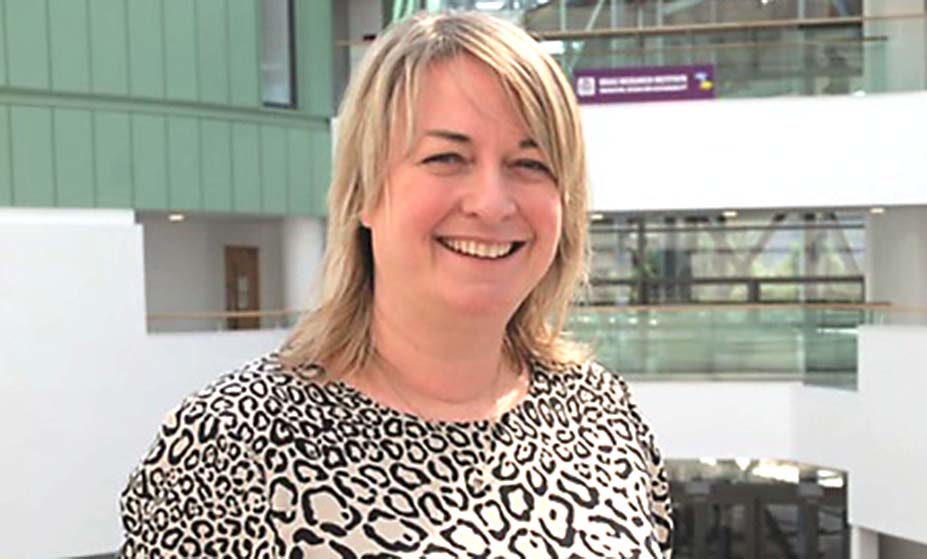
Courtesy of Alison Strath
Alison Strath took over as Scotland’s chief pharmaceutical officer in August 2021, having held the role on an interim basis since October 2020.
There’s certainly a lot going on under her watch. Scotland’s flagship Pharmacy First scheme, launched in July 2020, has helped cement community pharmacy as the first port of call for a wide range of minor ailments. It has clearly caught the attention of UK health secretary Sajid Javid, who said in an article for The Daily Mail in October 2021 that he had asked his department to look into a similar scheme in England.
In general practice, the pharmacotherapy service — which ultimately aims to provide pharmacist and pharmacy technician support to patients across Scotland — continues its roll out, albeit not without hiccups. In August 2021, the Royal Pharmaceutical Society and British Medical Association said in a joint statement that further investment was still needed to see “the full benefits of the service”, while a statement from Community Pharmacy Scotland later in August 2021 went so far as to call for a pause on recruitment into the service, citing an “unsustainable” drain from the community pharmacy workforce.
Published on 20 August 2021, the ‘Women’s health plan‘ will allow community pharmacy to provide much more in the way of women’s healthcare. And the hospital pharmacy sector awaits a report from Christine Gilmore, director of pharmacy at NHS Lanarkshire, around how hospital pharmacies could be transformed.
Catching up over Zoom on a sunny Friday afternoon, Strath spoke about how she sees the next few months playing out for the pharmacy profession in Scotland.
At the latest national pharmacy board meeting in September 2021, you said you would establish a pharmacy workforce forum — can you tell me more about that?
Pharmacy workforce is my number one priority. Pharmacy teams have risen to the challenges that COVID-19 has presented and I’m really proud and grateful for all that they’ve done. We should be thinking about how we invest back in them as a thank you.
Everybody wants a pharmacist in their team right now, but we exist in an ecosystem and if we pinch one part of it then we feel it in another part of it. The workforce forum will involve all sectors of the pharmacy profession: and I see the forum co-producing a vision for the pharmacy workforce, which sets out what good looks like. First of all in 12 months’ time, then, three years, five years and ten years.
The forum also needs to think a bit beyond pharmacy: it also needs to think about what part technology may play, how artificial intelligence may come in, and some of the changes that are coming in terms of more disruptive medicines. There are some meaty things for us get our teeth into and I’m keen to get the first meeting of the forum together before the Christmas break. Time is of the essence.
Are there enough pharmacy workers to fully staff the pharmacotherapy service in GP practices?
The question of whether we are losing lots of pharmacists from other parts — not just community but hospital as well — probably happened at the very early stages of pharmacotherapy. But more recently, people see community pharmacy being an exciting place to work again because of the growing clinical focus: in particular, Pharmacy First and the ability to utilise prescribing skills, and Pharmacy First Plus.
From that perspective, we’ve stopped seeing that kind of drain. Also, directors of pharmacy, who are responsible for delivering pharmacotherapy, are focused on growing our own pharmacotherapy workforce and not having it come from other parts of the system.
Do you have any sympathy with Community Pharmacy Scotland’s call for a pause on recruitment into the pharmacotherapy service?
I saw this as an issue right at the start when we did see pharmacists moving from community pharmacy into GP practices, but I haven’t really any evidence of that happening now. When I speak to directors of pharmacy, that’s what they say as well.
We have a commitment to deliver a pharmacotherapy service and we need to get the balance right
Of course, I’m always sympathetic to the fact that we need to have a resilient and robust pharmacy network: and community pharmacy is a front-facing, key part of the profession. Community pharmacists see people before they become unwell and often are the first and last port of call when they come in with a prescription. So it’s really important that our network is robust, and I certainly wouldn’t want to see things that that take away from it. But equally, we do have a commitment to deliver a pharmacotherapy service and we need to get that balance right. That takes us back to the workforce forum and how we co-produce solutions to some of these challenges.
The Pharmacists’ Defence Association has said there were quite a few unexpected pharmacy closures in Scotland — about 50 in one week. Is that still happening?
In terms of pharmacy closures, I don’t think Scotland is very different to other parts of the UK, speaking to my chief pharmaceutical officer colleagues. The workforce has been quite stretched and people are having to self-isolate as a result of COVID-19 regulations.
There’s been a lot of working between health boards, in particular, supported by Community Pharmacy Scotland and some of our pharmacy multiple groups, to understand why closures have been happening and what can be done about it. We’ve developed some good solutions around early notification of problems and an ability to try to work together to address them, so that health boards are confident that they’ve got pharmacies open when they expect them to be.
It was reported in The Times on 20 October 2021 that deadlines for COVID-19 booster jabs in Scotland had been put back by about a month or so. Would having more community pharmacy involvement help speed that up?
Two things here. On community pharmacy involvement in vaccinations historically in Scotland: because of the way our General Medical Services regulations were developed, we haven’t been able to offer a community pharmacy flu vaccination programme in the same way that other countries have.
I think there is potential for community pharmacists to get involved in supporting the booster programme. The fact is that we are going into a tricky winter period and we need to make sure that we are able to do the core business for community pharmacy.
Even if we were in a position to be able to step up and do more, I’m not sure that that is necessarily what we’d want to do. For me, the core business is around how we ensure that safe and secure supply of medicines to patients, and development of the Pharmacy First service and the wider role that pharmacists have in advising members of the public. To be able to try and then do that alongside a contribution into the flu and COVID-19 programmes would be quite challenging, and there’s lots of logistics that we need to put in place to deliver on that.
In the national pharmacy board meeting in September 2021, you said that there needs to be a “rebuilding” of infrastructure, in regards to pharmacy’s role in public health. What would that look like?
In the past, we had quite a robust network of pharmacists working at different levels within public health. I think we’ve lost a little bit of that. I don’t think pharmacy is alone in that — I think the public health network across the board has suffered some lack of investment.
From a community pharmacy perspective, we are thinking about what public health components we can build into the community pharmacy contract. Some of the services that we’re looking to develop — particularly around women’s health and sexual health, building on the work we’ve been doing over the years in supply of emergency hormonal contraception, into bridging contraception and, in the future, long-acting contraception — are all ways of building on community pharmacies’ public health role.
Similarly, we’ve seen great progress made in supporting smoking cessation services in the community setting. These are the things we want to build on. But where some of the gaps still lie are probably in the more strategic public health space. We should be thinking about how we continue to develop those skills in our pharmacists and see them doing Master’s in Public Health, for example, and maybe stepping into some more strategic roles within health boards.
What role will pharmacy play in delivering the ‘Women’s health plan’?
We’ve done the emergency hormonal contraception piece, we’re now moving into bridging contraception. The next part of the of the jigsaw will be long-acting contraception. We’re trying to build that up in an incremental way.
There are a range of other areas, particularly around menopause and endometriosis, and more generally around wider sexual health services as well. We’re working closely with policy colleagues who are leading on the ‘Women’s health plan’ to think about what bits that community pharmacy, in particular, can helpfully contribute.
The other area that has come up in conversations has been women’s heart health. We know that there are some specifics, particularly around different types of medicines, which don’t work as effectively in women. How can we link that back to the core parts of the pharmacy contract?
What difference is Pharmacy First making to Scottish patients?
It has made a real difference. We are going to do some general evaluation on Pharmacy First, but we’ve had more than 2 million consultations through Pharmacy First since it launched. We know that if we look at urinary tract infections (UTIs), impetigo and skin infections, we’ve had about 200,000 consultations. That’s time saved, potentially, from people having to go to the GP practice, which frees up GPs’ time to see people with greater needs.
We’re working with NHS 24 to think about the areas where they’re under pressure and where pharmacists could take that workload
What it doesn’t do is equate to more time for GPs, because their time gets filled with appointments: but they’re more appropriate appointments.
With the UTI services, there may be scope to spread the age category [currently services are available to patients aged 16–65 years], so that we can take further pressure off GP practices. We’re working closely with NHS 24 to think about the areas where they’re under pressure and where pharmacists could take that workload.
Will more patient group directions be added to Pharmacy First?
We’re working closely with NHS 24 and health board partners around some of the areas that we could logically extend to next. We’re trying to link that back to what the data are telling us about where demand is, so that we can try to manage demand across different parts of the service.
One of the areas that’s being looked at is [testing] sore throats as a next step, potentially. But there’s quite a range of areas where we could do more in terms of respiratory problems, ear infections, etc. So there is lots of opportunity.
Would you like to see a national naloxone supply service across pharmacies in Scotland?
It’s certainly something that we are considering. Currently, naloxone is delivered as a locally negotiated service across Scotland. All health boards have a degree of local availability, but we have quite a challenge in Scotland around drug death figures. Naloxone would certainly be one key area that we could build on, from what we already know from local service delivery.
Like all these things, there’s a balance about the pace and the timing of new initiatives. I am mindful, as I said earlier, that we’re about to go into probably quite a busy period for the NHS again. When would be a good time to introduce something new, and how do we do that in a way that doesn’t overwhelm? But I definitely think there’s some potential for that, and it is something we are exploring.
Is there anything else you’d like to share with our readers?
Importantly, I have commissioned Christine Gilmore, director of pharmacy at NHS Lanarkshire, to work on a report around enabling the transformation of hospital pharmacies. Hospital pharmacy is a key component of our mix and it’s really important to me that we ensure that we’re investing in it.
I’m keen that when we think about education and training that we think about postgraduate training as well as undergraduate. I’m keen to explore with my academic colleagues and with the NHS around what we should be doing; how we make sure that we have a really robust framework from initial education all the way through to advanced and expert practice.
I genuinely think this is a time for pharmacists to be curious and courageous. Sometimes we’re a bit cautious as pharmacists, but there are great opportunities ahead.


